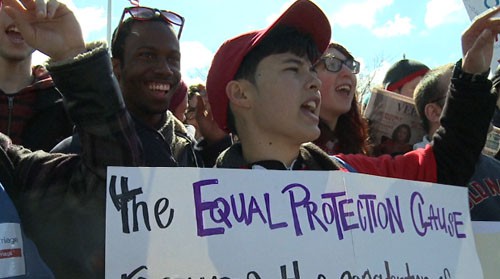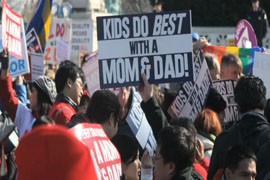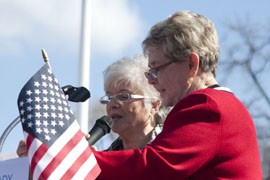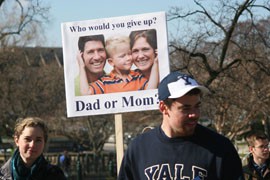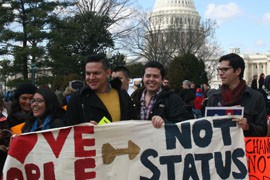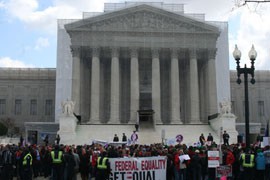Cronkite News has moved to a new home at cronkitenews.azpbs.org. Use this site to search archives from 2011 to May 2015. You can search the new site for current stories.
Arizonans join rallies at Supreme Court for, against same-sex marriage
WASHINGTON – Karen Bailey and Nelda Majors have been a couple for more than 50 years, but at a rally outside the Supreme Court they called Tuesday their “moment in history.”
“Why is it because we’re two women, our love is not recognized?” asked Bailey, a featured speaker at a rally in support of same-sex marriage Tuesday, when the high court began two days of historic hearings on the issue.
The Arizona women joined thousands outside the Supreme Court as the justices considered California’s gay marriage ban, Proposition 8. The court will be back Wednesday to consider the Defense of Marriage Act, a federal law that defines marriage between a man and a woman.
The justices’ decision on Proposition 8, expected sometime this summer, could determine the future of two Arizona laws: A ban on same-sex marriages and a law that eliminated benefits for the domestic partners of state employees.
Outside the court, the debate grew heated as thousands of gay marriage opponents marched from the National Mall to the front of the Supreme Court, where supporters were rallying. Many simply took offense at the government trying to redefine what they see as a religious institution.
“I don’t hate gays,” said Shenaye Holmes, a Maryland resident. “I do want them to come to the knowledge of the truth and to know that marriage in God’s sight is between a man and woman. No matter what any governing body says.”
Mike Foeckler said he came out to Washington to show the Supreme Court that Americans still care about marriage in the traditional sense, and redefining it would be wrong.
“It is just trying to make something normal that’s not natural,” said Foeckler, a Virginia resident.
Brooklyn resident Sara Amoros cited a higher authority than the Supreme Court.
“God does not like this,” she said. “God created a man and a woman for procreation of the people.”
While opponents cited religion for their cause, other religious leaders called on the court to embrace equality for all couples.
Gene Robinson, the first openly gay bishop in the Episcopal Church, asked the crowd to ignore protesters and focus on the equality that he said gay couples will inevitably win through court, and public, opinion.
“All we’re arguing about now is timing,” he said.
Lawyers for both sides said after Tuesday morning’s arguments that they thought the justices asked fair, knowledgeable questions, but neither side would venture a guess about the ultimate decision.
While gay-rights advocates hold out hope for a sweeping decision that could deem gay marriage bans unconstitutional, some in the crowd were simply encouraged by the hearing and the promise of continued progress.
“I can’t believe that it’s happening,” said Jim Devaty, who came from Pennsylvania with his partner of 23 years.
“Twenty years ago, we thought we were going to be together forever, but the government would always consider us good friends,” Devaty said.
For Jerssay Arredondo, from Phoenix, the rally was opportunity to further not only gay rights but also the rights of undocumented immigrants who were brought to America as children.
Arredondo came to Washington with the Queer Undocumented Immigrant Project to represent interests of what he said are a quarter-million homosexual undocumented immigrants in America. One of their rallying calls was: “Undocumented, unafraid, undocuqueer and unashamed.”
Arredondo was brought to this country from Mexico as a 3-year-old and he decided to get involved because staying silent in the shadows would not lead to greater equality or opportunity.
“I just want to give back what this great nation has given me,” he said.
Bailey and Majors said they just want equality. That includes the freedom to make decisions for each other’s healthcare and the ability to share equal custody of their children.
“Freedom needs to mean freedom for everyone,” Bailey said.
- Cronkite News Service reporter Michelle Peirano contributed to this report.

